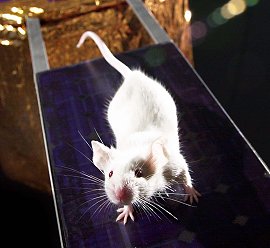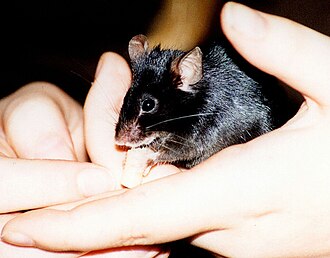AY Honors/Small Mammal Pets/Answer Key
Fancy mice ("fancy", in this context, means "hobby") are domesticated versions of the common or house mouse (Mus musculus).
Physical description
Fancy mice is a term to describe mice that have been selectively bred for pet or show. They can vary greatly in size, from small pet mice that are approximately 16-18 cm (6 inches or so) long from nose to the tip of the tail, to show mice that measure 30cm (12 inches) nose to tail. Pet mice weigh about 25-40 g but large show mice can weigh up to 100g. As fancy mice have a different process of natural selection than their wild cousins, they come in a variety of colours and patterns. These include black, chocolate, blue, white, cream, lilac, red, fawn, champagne, cinnamon, golden agouti, silver agouti, silver and dove. Female mice are called does and males are called bucks. If well cared for, a mouse lives for around 2 years on average, with some reaching 3 years old.
Mice as pets
Mice are kept as pets in many countries for a number of reasons. Fancy mice are small, inexpensive, clean, and generally have a good temperament. Female mice are popular with many owners since they tend to cohabitate with other mice better than males. Additionally, the urine of female fancy mice does not contain as strong of an odor as that of the male mice. Bucks can fight with each other, unless they are introduced at a very young age, and they produce urine with a strong, musky smell. Some people, however, prefer the personality and curiosity of male mice. It is a good idea to keep fancy mice in groups of at least two if possible, as mice are sociable animals. However, if a buck and a doe of breeding age are put in the same cage they will produce a new litter every three weeks until separated.
Feeding
Food for fancy mice is relatively inexpensive. Veterinarians generally recommend a product called lab block, a scientifically-formulated blend originally designed for mice in laboratories. Dry dog food is another good option when lab block is unavailable, as it offers balanced nutrition for a mouse and helps keep their teeth conditioned. Special mouse food found in pet stores also makes a good diet. In order to keep variety in their diets, mice can also eat oats, oily seeds, clean egg shell, breakfast cereal, and stale bread. Fruit and vegetables can be offered occasionally. They should also have clean water at all times and some sort of chewing wood in order to keep their teeth from growing too long.


